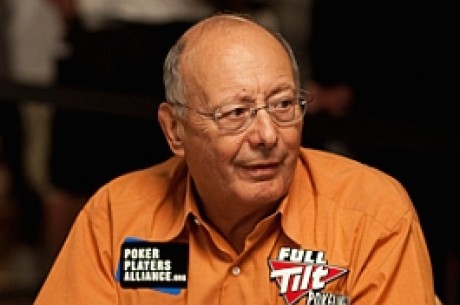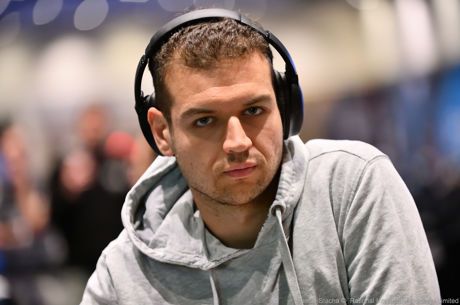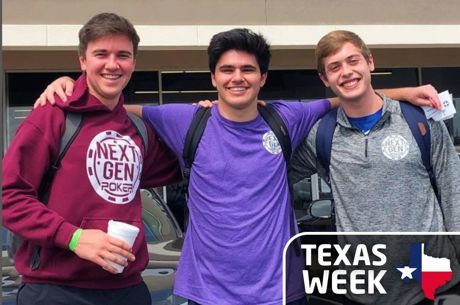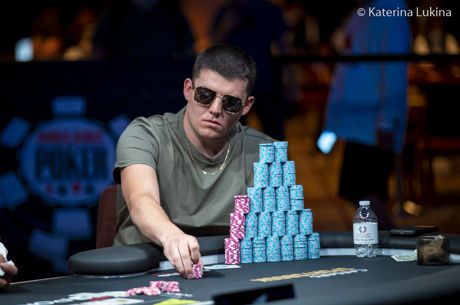The PokerNews Interview: PPA Executive Director John Pappas, Part 1
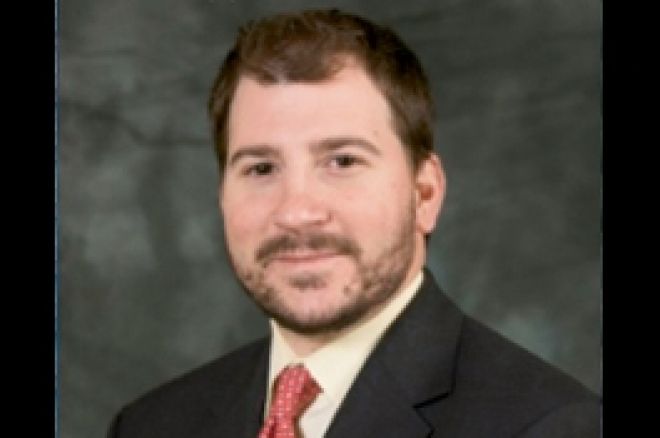
Poker Players Alliance Executive Director John Pappas is a native Arizonan who’s been involved in politics for his entire adult life. Pappas, who describes himself as a “huge fan of poker,” also enjoys golf and cooking when he’s not busy with PPA matters on the national scene. Pappas went into public policy, working in Washington D.C. immediately after graduating from college in 1997. The PPA’s operational head worked on Capitol Hill for six years for a member of Congress on the Homeland Security Committee, then moved on to professional lobbying with a D.C.-based public affairs firm for another firm before joining the Poker Players Alliance in 2007. Pappas sat down with PokerNews recently for a lengthy chat about poker’s political stance in the United States today.
PokerNews: The Poker Players Alliance made a grand appearance at the 2009 World Series of Poker, unveiling several new initiatives. Briefly, what are these and how will they help poker?
John Pappas: These are ways in which we can turn the average poker player into what we like to call poker advocates. As we heard from a current member of Congress (Shelley Berkley) and our chairman Alfonse D’Amato, the only way we’re going to change how Washington thinks about poker and the ability of Americans to play is if they recognize that poker players care… and that they vote. The best way to demonstrate that is through National Poker Week, which will take place July 19-24, 2009, where we’re inviting our 50 state directors to Washington D.C., as well as a number of poker professionals to meet with members of Congress one on one. More importantly, we’re going to try to engage the broader poker community from across the country to weigh in during that week, to let Congress know that poker’s not a crime, it’s a pastime that they enjoy, and that [Congress] should lessen any restrictions on people being able to play on the Internet.
We’ve created a number of different vehicles for people to do this. The first one is called pokerpetition.com. This is a petition that will be signed by poker players and will be delivered to President Obama during National Poker Week. I’m excited to get to six figures and then to seven figures and be able to drop a huge stack of paper on President Obama’s desk. [Note: Over 125,000 people signed the online petition in the first four days of its existence.]
We’ve also created a site called mypokerstory.com, which allows people to upload videos of themselves, to tell their story about why they love the game. This is an effort to personalize poker players for members of Congress and the community at large. People have a misconception that poker players are handlebar-moustached, cigar-smoking individuals in a back room somewhere, when in reality, people who play poker – everyone from your mother or sister to your neighbor who’s a doctor, to college graduates and college students who are doing this as a great form of recreation. And for some people it’s a livelihood.
Finally, we have nationalpokerweek.com, which is a site you can go to for information on National Poker Week and how you can become an advocate during that week. We’ll be posting updates on that site over the next month.
PN: In its press conference at the World Series of Poker, PPA officials mentioned legislation separate from the Barney Frank regulatory bill currently under consideration. Can you comment on this for our readers?
Pappas: We’ve been working with Senator Robert Menendez (D-NJ), who introduced legislation at the end of last Congress, which was called the Skill Game Protection Act. It essentially would set up a licensing regimen for online skill games, meaning peer-to-peer, non-house-banked games. That would include poker, bridge, chess, mahjongg, backgammon and other games that people play against each other [in their own house]. That is legislation that we have been working to get reintroduced, hopefully in time for National Poker Week, so we can use that as part of our national poker advocacy platform in Washington.
PN: Speaking of Barney Frank, what’s the latest with his and the McDermott bills?
Pappas: The Barney Frank bill has been dropped [“dropped” means introduced as a bill], as H.R. Bill 2267. It has a few warts that we’re hoping to work through, yet inasmuch as it licenses and regulates Internet poker the PPA is completely supportive of the bill. As I like to say, I don’t want to let perfection get in the way of progress. Any piece of legislation when it’s introduced is simply a draft. You can never consider it a final product; it’s going to go through many iterations. Barney [Frank’s] committed to holding a hearing on this legislation in July of this year, so probably right around the time the World Series completes, Barney will be holding a hearing. He wants to hold an open debate about it and not hide it behind some other hearing, as they did to us in 2006. (Update: the planned hearing for July has been rescheduled for September, following Congress’s summer recess.)
PN: Legislation is a slow process. What are the chances that any of these bills could pass in 2009 or shortly thereafter?
Pappas: It’s difficult to handicap it; it really is. As was noted by Congresswoman Berkley and as anyone can know by reading the papers, Congress has a lot of issues on their plate and really, poker isn’t probably on their radar screen. That’s why we’re hoping to elevated the issue into lawmakers’ minds through National Poker Week. I think that will help us get to appoint where we can at least get a bill passed out of the House and be in discussions over how we can get something out of the Senate for next year.
I don’t know if we can get everything all at once; it certainly would be our goal, but I think we’re going to have a little work to do in the Senate still. I think if we can get improvements to Barney’s bill he has a very good chance of getting his bill out of committee in a noncontroversial fashion, and give the Democratic leadership the comfort level to bring it to the House floor for a vote. Democrats don’t want to bring anything to the floor that’s going to serve as a wedge issue against vulnerable Democratic members, and there are a number of vulnerable Democratic members, people who won their district, who won their election, but John McCain won their district [in the Presidential election], and so they have to be very wary of that.
This is again why National Poker Week is so important. If we can demonstrate that there are millions of Americans who care about this, then what do lawmakers have to worry about? If they know there’s 20,000 people in their Congressional district who care about this vote, versus the 8,000 who may say that they oppose it, we win. We win by 12,000 votes, and that’s a huge difference.
PN: Analyses have been made regarding the Frank regulatory legislation that suggest that conservative Democrats – the “blue dog” Democrats – are a key Congressional constituency. Is that the group that qualifies as having these wedge considerations?
Pappas: Certainly. And I think one of the ways you get beyond those “blue dogs” who may have social concerns about this is the fiscal value that regulation brings. Right now it costs us money to try to prohibit online poker. Through licensing and regulation the federal government could be making money. Internet poker provides a venue, provides revenue, for paying for some of these programs that these blue dogs might not otherwise support because the revenue isn’t there.
PN: Referring to Barney Frank’s legislation, how does the PPA feel about the “states rights” issues?
Pappas: It’s an interesting paradox for us. Because of the Constitution, and the abilities of states to opt in and opt out of federal regulatory regimes as provided to [the states] under the Constitution, the language probably isn’t as strong enough as we would like to see. We wouldn’t like to see a governor just simply be able to say, “I’m opting out of Internet gambling.” We’d like for them to be able to point to specific reasons why.
Unfortunately, what we’ve come across and what a lot of legal scholars have told us is that the more you make restrictions on that, the further you have constitutional problems, and you’ll find challenges from the states themselves saying that the law is unconstitutional, because it wouldn’t allow them to easily opt out. We’ll see if there’s ways of tweaking it and improving it. We have some amendments out there and we’re running them by constitutional scholars as well as Barney Frank’s office to see if he would accept it.
Beyond that, I think the onus is going to be on the poker players and those who want this right. If legislation like this does come to pass, the focus has to turn from Congress to their local legislators, their governors and their attorneys general to say, “This legislation passed; the state wants to partake in the revenue that could be associated with Internet poker.” If they want to ensure that their players in their state aren’t forced to find unlicensed, unregulated sites to play on, then they should opt in to this regime, as a way not only to protect their state’s consumers, but also to collect the revenue that can be generated.
In Part 2 of this interview, PPA Executive Director John Pappas talks about the coming implementation of UIGEA regulations, the recent seizure of approximately $40 million in online poker players’ funds, and the future outlook of the PPA.

